As an Amazon Associate I earn from qualifying purchases.
Cumberland sauce, essentially a British sweet-and-sour sauce, is one of the oldest sauces still commonly made today. Dating to the 1700s, it has been modified only slightly since then. It’s an easy-to-make pan sauce great with venison or any red meat.
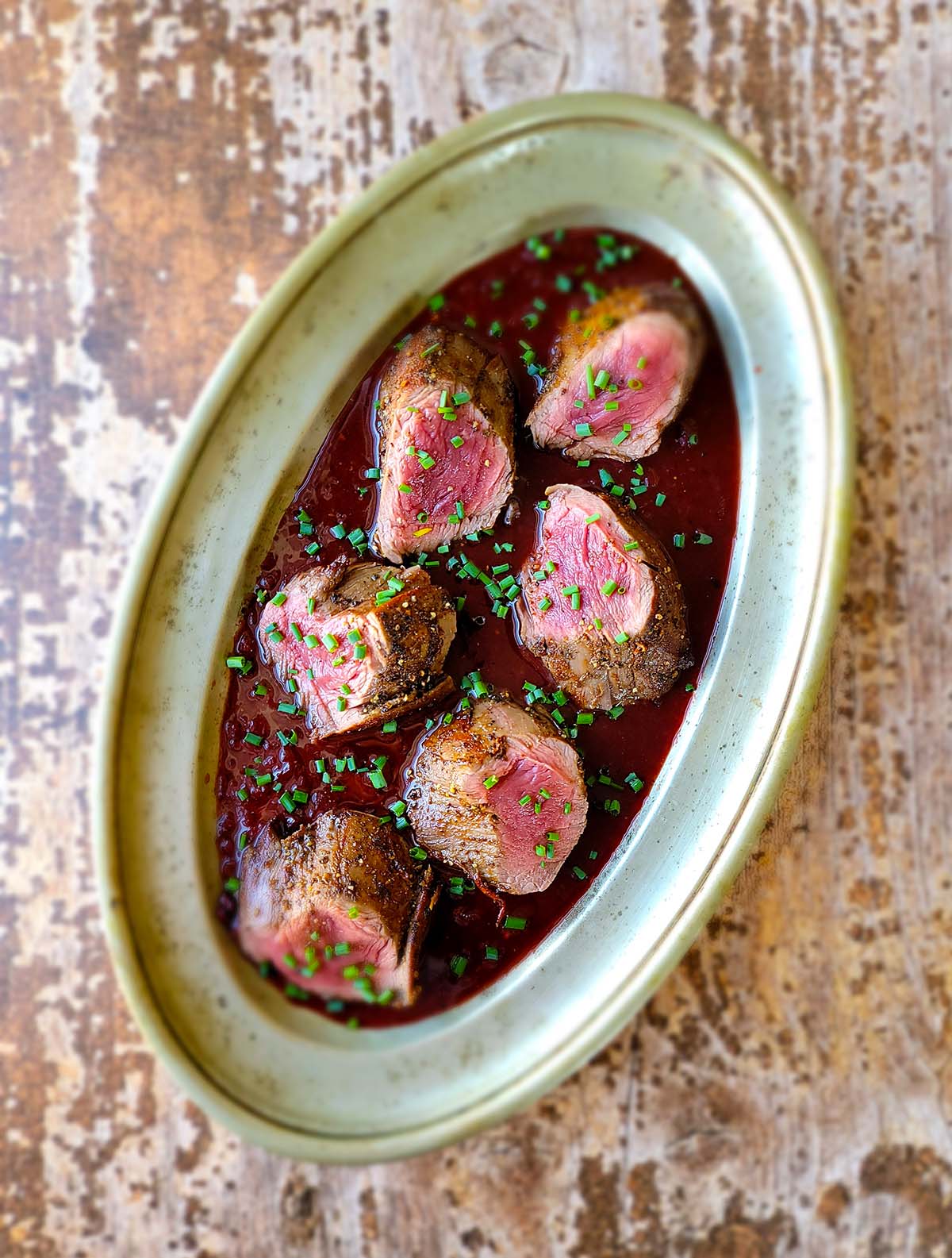
The great food writer Jane Grigson, in her Fruit Book, writes that the first real reference to a Cumberland-like sauce is in Hannah Glasse’s 1747 cookbook, The Art of Cookery Made Plain and Easy. Glasse’s version of the sauce includes red currants, red wine, sugar and red wine vinegar; it’s basically a modern gastrique.
The addition of Port wine and meat stock to the sauce arrives by 1817, and the sauce as we know it now — with the addition of mustard and citrus — is fully formed by 1846.
What’s the big deal about Cumberland sauce, and why should it persist so long in our kitchens? Because it is a perfect balance of sweet, spicy, savory and salty. Whenever you achieve this balance in cooking, people will remember you… or at least your food. A good barbecue sauce hits all these notes, as does all proper Vietnamese food.
And while there is no one true recipe for Cumberland sauce, it always has at least the following:
- Red currants, either in jelly or syrup or as whole fruits. You can substitute other tart red fruit, however, and I’ve used cranberries, highbush cranberries, lingonberries and even raspberries with good results.
- Red wine or Port. No substitute, so if you cannot use alcohol in your cooking, you are out of luck. You can make a facsimile of Cumberland without wine, but it will not be the same sauce.
- Citrus. Most recipes have either lemon or orange zest plus some juice, too. If you can ever get your hands on bitter Seville oranges, they are what was historically used.
- Meat stock. As we just saw, the oldest versions of Cumberland didn’t have this, but the addition of meat stock — especially demi-glace or glace de viande – adds a lot to the flavor. If you don’t have demi, use unsalted stock and boil it down. If you can only find salted stock, be very careful because boiled-down stock will get very salty.
- Spices. English dry mustard (Coleman’s) is almost always used, and so is freshly ground black pepper. And I mean freshly ground: It makes a difference in this case, as black pepper is one of the primary flavors in this sauce. A lot of recipes also add a pinch of cayenne pepper. This might sound modern, but keep in mind that cayenne starts appearing in European food as early as the 1600s. The iconic French chef Auguste Escoffier added ground ginger to his version of Cumberland.
You can certainly make Cumberland sauce on the side, or you can do as I do and make it as a pan sauce when you are done cooking. I prefer this method because it takes advantage of the browned bits in the pan and uses fewer pots, which means less to clean up afterwards.
This sauce is also perfect for pan-seared venison tenderloin, but you need not restrict yourself to venison here. Cumberland has been used for hare, lamb, duck and goose since it was invented. It is one of my all-time favorite sauces for a simply seared duck breast, wild or domestic.
What goes well with Cumberland on the plate? I like simple mashed potatoes, but boiled or baked potatoes are just as good. Polenta or fried hominy is excellent, as would any other mashed root vegetable. Or go simple and just serve it with a green salad and some nice, crusty bread.
I have several similarly classic wild game sauces that work well with venison, like venison medallions with gin and juniper, and the venerable steak Diane.
If you liked this recipe, please leave a ⭐️⭐️⭐️⭐️⭐️ rating and a comment below; I’d love to hear how everything went. If you’re on Instagram, share a picture and tag me at huntgathercook.
Cumberland Sauce with Venison
Ingredients
VENISON
- 1 to 1/2 pounds venison backstrap, in one piece
- Salt
- 3 tablespoons unsalted butter, duck fat or cooking oil
CUMBERLAND SAUCE
- 1 shallot, minced
- Salt
- 1/2 cup Port wine, or red wine
- 1/4 cup Demi-glace, or 1 cup regular stock (unsalted stock if possible)
- 1/2 teaspoon dry mustard
- 1/4 teaspoon cayenne
- Zest of a lemon and an orange
- 1/3 cup Red currant jelly (or similar, see headnotes)
- Freshly ground black pepper
Instructions
VENISON
- Take the venison out of the fridge and salt it well. Let it rest at room temperature for 30 minutes.
- Melt the butter over medium-high heat in a saute pan large enough to hold the venison. When it's hot, turn the heat down to medium. Pat the meat dry with paper towels, then brown the venison on all sides. Use the finger test for doneness to cook the meat to the level you want. I prefer medium-rare. Remember it will continue to cook as it rests, so take it out a little before it reaches the doneness you want. Move the meat to a cutting board, grind black pepper over the meat, and let it rest while you make the sauce.
CUMBERLAND SAUCE
- When your meat has come out of the pan, make sure there is at least 1 tablespoon of butter or oil in it. If not, add more. Saute the shallot over medium-high heat for 2 minutes, just until it softens. Don't let it burn. Lightly salt the shallots.
- Add the Port wine and use a wooden spoon to scrape up any browned bits stuck to the pan. Let this boil furiously until it is reduced by half. Add the demi-glace (or stock), the citrus zest, mustard and cayenne and let this boil for a minute or two. Stir in the red currant jelly and the black pepper. Let all this boil down until it is thick, but still pourable. You want a wooden spoon dragged through it to leave a trail for a moment. You can strain the sauce if you want it more refined.
- Slice the venison into medallions. Pour any juices that have come out of the meat into the sauce and stir to combine. Serve with the sauce either over the meat or alongside.
Notes
- Cumberland sauce stores well for a couple days, and is surprisingly good cool or at room temperature; the English serve it cool with cold meats.
Nutrition
Nutrition information is automatically calculated, so should only be used as an approximation.
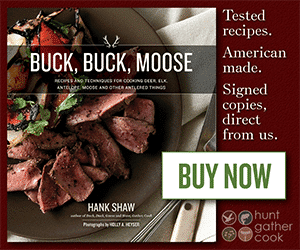
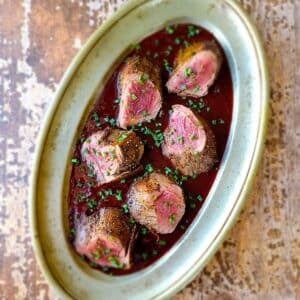
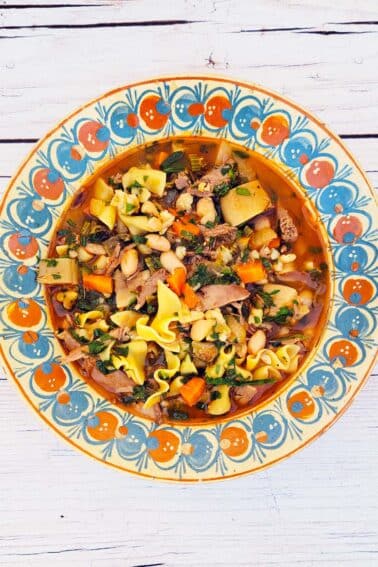
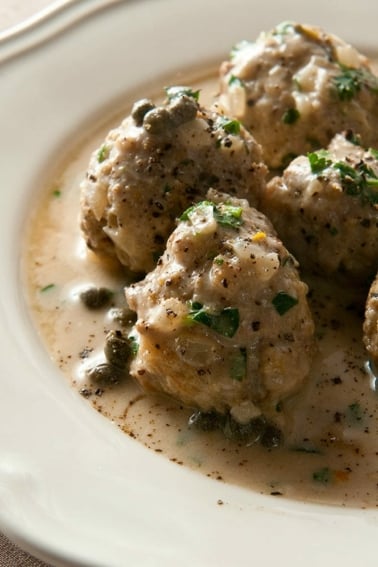
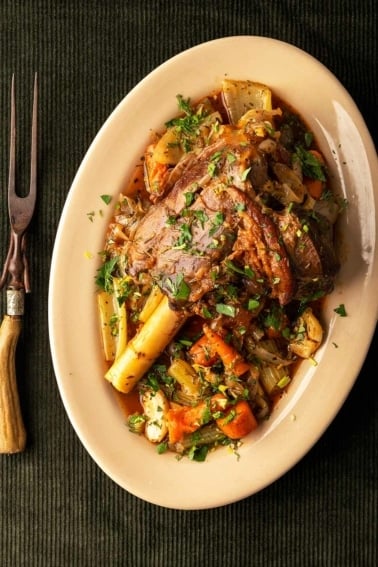
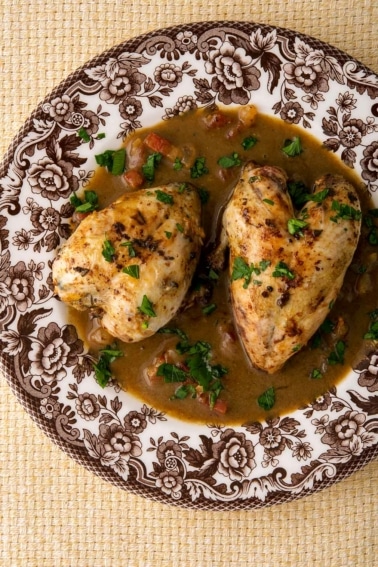
I’m a better person now that I’ve learned this recipe! No Currant? Sub any tart/sour fruit jam. No shallot? Sub onion. No demi? Reduce more. No port? Table wine is fine. I made this for the third time tonight — each time subbing at least 1/3 of the ingredients, and each time it’s fantastic. Magic happens when you play with the sweetness (jam, onion, sugar) and the heat (cayenne).
Thank you for sharing it.
Made this tonight. Not only was it tasty, it was easy to make
will make again!!
I made this last night. Delicious! Then I added one pat of butter to the sauce. Still yummy. I didn’t strain. I’m making this for my dear camping trip in February. Thank you!!!
Hank,
I shot a brace of woodcock the other day and want to make this sauce, per your roast woodcock recipe. I can’t find red currant jelly at the store here, but I have elderberry and gooseberry jelly in our pantry. Could I sub either of those for the red currant jelly?
I made this sauce for the first time and served it with venison tenderloin. It was truly delicious and complemented the meat perfectly!
Super easy and a great way to plus-up a steak.
You are not going to believe this but I used to help my maternal grandmother make red current syrup for her kitchen every year. She would use it in her fruitcake and to make a sauce to go with beef and venison. It’s been nearly thirty years since I last helped her make it during the last summer of her life. After her death, Aunt Ruth (her youngest daughter) brought me half the bottles that were left in her pantry. The sauce Grandma Mortimer made was a lot like your Cumberland sauce except she used locally made moonshine for the alcohol.
This turned out very good. I used unsalted stock so the boil down took longer than I was expecting. Smell was amazing and I just wanted to eat! Very good sauce that paired perfectly withth the loin.
will be making your recipe for a butterflied leg of lamb for our Thanksgiving dinner
I read your receipe for Cumberland Sauce. I used it with a flank steak. So easy,so deliscious. Can’t wait to use it with duck.
I’ve used this recipe on grilled dove and lamb chops. absolutely delish. I love all the sweet and savory combo’s.
The season is upon us! If you haven’t taken the opportunity to try this recipe yet, please do not deprive yourself of any more joy. I used red current jelly, orange zest, Port wine, homemade glace de viande, and Coleman’s mustard. Strained the sauce through fine mesh strainer. Very delicious! You will be glad you made it. Gave it 5 stars because there weren’t 7. Thanks, Hank!
This is spot-on, fantastic with venison medallions or steaks. I usually end up using cranberries (cooked) because they are readily available. Have turned to this recipe numerous times and always enjoy it immensely. My mouth is watering ….
sounds delicious and simple to make .i must try it .